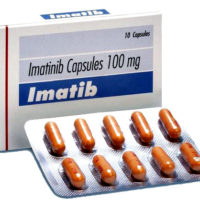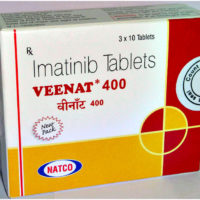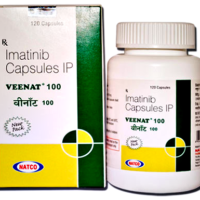| Active substance | Imatinib |
| US Brand | Gleevec |
| IN Brand | Veenat, Imatib |
| Manufacturing by India | Natco, Cipla |
| Strength | 100mg, 400mg |
| Form release | bottles 120 tabs, or blister 10tabs |
| Estimated shipping time | 7 – 18 days (Depending from the Country) |
| Availability, Prices & Order | through request form |
What imatinib is
Imatinib is pronounced im-at-tin-ib and is also known by its brand name Glivec (pronounced glee-vec).
It is a treatment for
- Chronic myeloid leukaemia
- Gastro Intestinal Stromal Tumour (GIST) – a rare type of stomach cancer
- Acute lymphoblastic leukaemia that is Philadelphia chromosome positive
- A rare type of sarcoma called dermatofibrosarcoma protuberans
- Adults with myelodysplastic disorders
- Adults with myeloproliferative disorders
- Adults with advanced HES (hypereosinophilic syndrome) or chronic eosinophilic leukaemia
Acute Lymphoblastic Leukemia
Indicated for adults with relapsed or refractory Philadelphia chromosome positive (Ph+) acute lymphoblastic leukemia (ALL)
600 mg PO qDay
Myelodysplastic/Myeloproliferative Diseases
Indicated in adults with myelodysplastic/ myeloproliferative diseases associated with platelet-derived growth factor receptor gene re-arrangements as determined with an FDA-approved test
400 mg PO qDay
Hypereosinophilic Syndrome/Eosinophilic Leukemia
Indicated for adults with hypereosinophilic syndrome and/or chronic eosinophilic leukemia who have the FIP1L1-PDGFR-alpha fusion kinase (mutational analysis or FISH demonstration of CHIC2 allele deletion) and for patients with HES and/or CEL who are FIP1L1-PDGFR-alpha fusion kinase negative or unknown
400 mg PO qDay
In patients with demonstrated F1P1L1-PDGFR-alpha fusion kinase: 100 mg PO qDay; may increase to 400 mg qDay in the absence of adverse drug reactions if assessments demonstrate an insufficient response to therapy
Chronic Myeloid Leukemia
Chronic phase
- Newly diagnosed adult and pediatric patients with Philadelphia chromosome positive (Ph+) chronic myeloid leukemia (CML) in chronic phase
- 400 mg PO qDay
- Chronic phase after failure of interferon-alpha therapy: May increase to 600 mg/day in the absence of severe adverse drug reaction and severe nonleukemia related neutropenia or thrombocytopenia in the following circumstances: disease progression (at any time), failure to achieve a satisfactory hematologic response after at least 3 months of treatment, failure to achieve a cytogenetic response after 6-12 months of treatment, or loss of a previously achieved hematologic or cytogenetic response
Accelerated phase or blast crisis
- 600 mg PO qDay
- May increase to 400 mg PO q12hr in the absence of severe adverse drug reaction and severe nonleukemia related neutropenia or thrombocytopenia in the following circumstances: disease progression (at any time), failure to achieve a satisfactory hematologic response after at least 3 months of treatment, failure to achieve a cytogenetic response after 6-12 months of treatment, or loss of a previously achieved hematologic or cytogenetic response
Dermatofibrosarcoma Protuberans
Indicated for adults with unresectable, recurrent and/or metastatic dermatofibrosarcoma protuberans
400 mg PO q12hr
Mastocytosis
Indicated for adults with aggressive systemic mastocytosis without the D816V c-Kit mutation as determined with an FDA-approved test or with c-Kit mutational status unknown
Without D816V c-Kit mutation: 100 mg PO qDay
c-Kit mutational status unknown: 400 mg PO qDay if not responding to other therapies
ASM associated with eosinophilia (a clonal hematological disease related to the fusion kinase FIP1L1-PDGFR-alpha): 100 mg PO qDay initially, may increase to 400 mg/day in absence of adverse effects if response to therapy is insufficient
Gastrointestinal Stromal Tumors
Unresectable and/or metastatic malignant GIST
- 400 mg PO qDay; may increase to 400 mg BID in patients showing clear signs or symptoms of disease progression at a lower dose and in the absence of severe adverse drug reactions
Adjuvant treatment following complete gross resection of GIST
- 400 mg PO qDay x3 years
Dosage Modifications
Withhold treatment if fluid retention
Hematologic toxicity
- Generally, discontinue if ANC <1000/mm³ and/or Plts <50,000/mm³
- Resume when ANC >1500/mm³ and Plts >75,000/mm³
- See Mfr’s PI for specifics
Hepatotoxicity
- Withhold if bilirubin >3x ULN or ALT/AST >5x ULN
- Resume after bilirubin <1.5x ULN and ALT/AST <2.5x ULN at a reduced dose (ie, 400 mg to 300 mg; 600 mg to 400 mg; 800 mg to 600 mg)
- Withhold if severe hepatotoxicity; once resolved, reduce dose by 25%
Dosing Considerations
Monitor
- CBC qWeek x 4, then q2Weeks x 2, then periodically
- LFTs at baseline and qMonth
- Signs of fluid retention
Administration
Take with meal and a large glass of water
For patients unable to swallow, tablets may be dispersed in water or apple juice
Treatment may be continued as long as there is no evidence of progressive disease or unacceptable toxicity
Imatinib may cause side effects. Tell your doctor if any of these symptoms are severe or do not go away:
- diarrhea
- nausea
- vomiting
- change in the way things taste
- mouth sores or swelling inside the mouth
- loss of appetite
- weight loss
- heartburn or indigestion
- dry mouth
- headache
- joint swelling or pain
- bone pain
- muscle cramps, spasms, or pain
- tingling, burning. or prickling feeling on the skin
- difficulty falling asleep or staying asleep
- sweating
- teary eyes
- pink eye
- flushing
- dry skin
- rash
- itching
- nail changes
- hair loss


